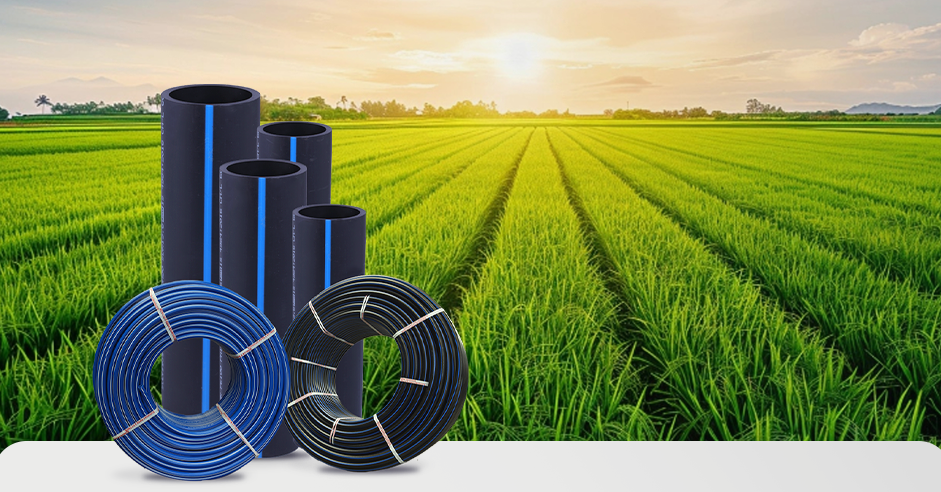Understanding the Secret Advantages of HDPE Pipe for Water and Wastewater Management
Using HDPE pipeline in water and wastewater management presents many benefits that warrant consideration. Its remarkable resilience and lengthy life-span make it a recommended selection for lots of projects. Additionally, the product's resistance to rust and chemical damage improves its integrity in various environments. The advantages prolong beyond just long life and resistance. American Plastics HDPE Pipe for Oilfield. Discovering its cost-effectiveness and environmental effect reveals a lot more compelling reasons for its extensive fostering in modern-day facilities
Phenomenal Sturdiness and Long Life

HDPE pipe attracts attention for its outstanding durability and long life, making it a recommended option in water administration systems. Constructed from high-density polyethylene, these pipes can hold up against significant pressure and stress and anxiety, making certain trusted efficiency in time. Their durable nature enables them to endure severe environmental conditions, including temperature variations and soil activities, which can cause other materials to fall short.
The life-span of HDPE pipelines often surpasses 50 years, offering an economical service for districts and markets alike. Additionally, the material's lightweight residential or commercial properties simplify installment, minimizing labor expenses and timeframes. This longevity minimizes the demand for constant repairs or substitutes, better enhancing its economic charm.
In water administration applications, the dependability of HDPE pipes indicates fewer disruptions and improved solution connection, making them indispensable to lasting facilities development. The mix of durability and long life strengthens HDPE's function as a foundation in reliable water management services.

Resistance to Rust and Chemical Damages
While lots of materials catch deterioration and chemical damages over time, HDPE pipelines exhibit impressive resistance, making them perfect for numerous water administration applications. This strength originates from the molecular framework of high-density polyethylene, which is inherently non-reactive and does not corrode like steels or weaken from direct exposure to harsh chemicals. Consequently, HDPE is highly efficient in settings with hostile materials, such as wastewater systems that might contain acids, bases, and organic solvents.
Additionally, HDPE pipelines can stand up to environmental factors such as soil acidity and saline conditions, additionally boosting their suitability for diverse applications (Midland TX HDPE Pipe Fittings in Stock). Their capacity to preserve architectural integrity with time lowers the threat of leaks and failures, which is crucial in ensuring the safety and security and integrity of water circulation and wastewater administration systems. Consequently, the resistance to corrosion and chemical damage noticeably adds to the general effectiveness and longevity of HDPE piping options
Cost-Effectiveness and Economic Advantages
When taking into consideration the economic implications of water administration systems, the cost-effectiveness of HDPE pipes becomes noticeable. These pipelines use lower setup and maintenance expenses contrasted to conventional materials like metal or concrete. Their light-weight nature streamlines transport and setup, causing reduced labor expenditures. Furthermore, continue reading this HDPE pipelines exhibit a long lifespan, typically exceeding half a century, which converts to fewer replacements and lasting cost savings.
Furthermore, the resistance of HDPE to rust and chemical damage decreases the requirement for expensive repair services and replacements. The pipelines also support efficient water flow, lowering power costs related to pumping systems. By minimizing leakages and water loss, HDPE pipes add to substantial financial benefits for districts and industries alike. Generally, the first financial investment in HDPE piping can produce significant economic returns over the lifespan of the water monitoring system, making it a prudent selection for lasting facilities advancement.
Environmental Sustainability and Reduced Impact

Versatility and Adaptability in Installment
Due to their one-of-a-kind residential or commercial properties, HDPE pipelines supply remarkable flexibility and flexibility in installment, making them suitable for a vast range of applications. Their light-weight nature allows for simpler handling and transportation, lowering labor expenses and installment time. HDPE pipelines can be bent and shaped to fit various surfaces and job needs, which is especially advantageous in challenging environments.
Furthermore, their resistance to rust and chemical damage allows for installment in diverse setups without the demand for specialized protective coatings. The capacity to fuse joints develops a constant, leak-free system, boosting the general stability installing gas line from street to house and integrity of the setup. HDPE's adaptability likewise suits ground motion, decreasing the threat of damage in locations susceptible to shifting dirt. In general, these features make HDPE pipelines not only flexible however additionally a recommended choice for water and wastewater monitoring systems.
Regularly Asked Questions
Just How Does HDPE Pipeline Compare to PVC in Water Administration Applications?
HDPE pipe supplies superior versatility, resistance to deterioration, and durability contrasted to PVC. Its lighter weight facilitates simpler installation, while its lengthy life expectancy reduces replacement expenses, making HDPE a recommended choice in water monitoring applications.
What Is the Life-span of HDPE Piping Under Normal Problems?
Under normal problems, HDPE pipelines can have a life expectancy varying from 50 to 100 years. Their longevity and resistance to deterioration add to their long-term efficiency in numerous applications, making them a trustworthy option for infrastructure.
Are HDPE Piping Recyclable After Their Service Life?
Yes, HDPE pipelines are recyclable after their life span. Midland TX HDPE Pipe Fittings in Stock. They can be processed and repurposed right into new items, greatly reducing environmental impact and see this here advertising sustainability within the sector, making them an environment-friendly selection for piping options
What Is the Setup Process for HDPE Piping?
The setup procedure for HDPE pipes includes website preparation, trenching, pipe blend or mechanical signing up with, backfilling, and stress testing. Correct methods assure a sturdy and effective system for transporting water and wastewater properly.
Can HDPE Pipes Be Made Use Of for Both Potable and Non-Potable Water Equipments?
Yes, HDPE pipes can be utilized for both potable and non-potable water supply. Their versatility, toughness, and resistance to deterioration make them ideal for various applications, guaranteeing safe and effective transportation of water in different contexts.